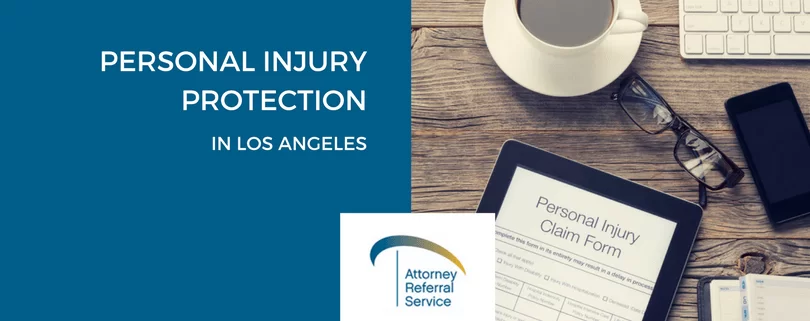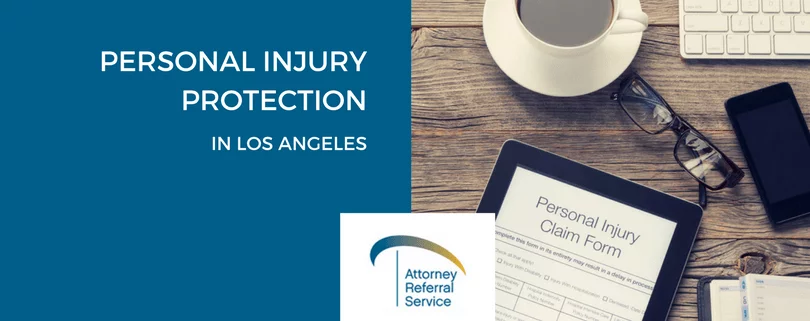Why You Need Personal Injury Protection
Working with a personal injury attorney in Los Angeles can protect you from financial hardship so you can afford the medical attention you need.
In California as in other states, you need personal injury protection because if you are injured by someone else, you may be entitled to compensation for that injury. A personal injury attorney can help you obtain the best outcome for any such injury. A basic understanding of personal injury law will be helpful to you should such an injury situation occur.
Personal injury law refers to the legal defense process involved in civil lawsuits brought as a result of wrongful conduct, in legal terms, a “tort.” The word comes from a Latin term meaning wrong, harm or twist.
A tort action involves a private party, a plaintiff, who seeks compensation for the harm caused by the actions of a defendant. This differs from criminal law where the government prosecutes a wrongdoer.
Negligence
Personal injury law in most cases is based on the principle of negligence, which requires all members of society to act responsibly and not put others at risk. But negligence is not always involved when someone does get hurt. Some accidents are just unavoidable. To establish negligence, a plaintiff has to show that a reasonably intelligent and prudent person would have acted differently than the defendant in the same circumstance.
Negligence can come from drunk drivers who cause accidents or medical professionals who are careless and cause medical complications, defective products, and many other situations where people act irresponsibly by ignoring the possible risk to others.
In addition to negligence, there are other causes of actions that can result in personal injury. Many of these can be classified as intentional torts where a defendant acts to purposely harm the plaintiff. Examples include assault, battery, trespassing, theft, and causing emotional distress.
Strict liability
While some torts are intentional, there is another class of torts where defendants tried to avoid causing harm but were still held accountable and liable. These are referred to as strict liability.
Strict liability can occur if the defendant is engaged in a dangerous activity such as building demolition or the transportation of hazardous material, and an injury occurs. The defendant is held to be strictly liable – even if the actions were legal and proper precautions were taken.
Defective products
A manufacturer who designs and sells an unsafe product that results in personal injury can be held liable because of negligence. There are other situations where products can cause injury, and these can result in legal action under the strict liability principle.
If many plaintiffs are injured by the defective product, a large class action lawsuit can be brought against the defendant, with the potential for significant money judgments.
Defendants try to argue that the plaintiff did not use due care and is responsible in part or in full for the resulting injury. They may also claim that, by voluntarily participating in the activity, the plaintiff assumed any risk. Another claim is that the plaintiff implied that the defendant had permission to take the action that resulted in injury.
A good personal injury lawyer can recognize these arguments and is experienced in dealing with them. Having such a lawyer on your side can improve your chances for a positive outcome.
Common law and the elements of negligence
In the US, most states follow a legal tradition called “Common Law” that dates back to England and the colonial days. Certain legal principles have evolved and remain relatively constant from state to state.
Regarding negligence, Common Law has led to the identification of four basic elements or conditions that are necessary for the legal interpretation of a negligent act. They are duty, breach, causation, and damages.
The duty of care refers to the legal obligation of an individual or company to adhere to a standard of reasonable care when their acts could possibly harm others. An example would be to not shoot off fireworks in a crowd or not light fires too close to a neighbor’s house.
Breach is a violation of duty where someone fails to do what he or she is supposed to do according to the duty of care. Setting off fireworks in a crowd is a breach of duty of care.
Breach of duty is not enough to show negligence. While this could cause harm to someone, there needs to be the actual cause of harm. Causation connects breach to injury. If setting off fireworks in a crowd does not cause injury to anyone, there is no causation and no connection between the act and an injury.
But if an injury does occur, like someone getting burned or having a loss of hearing when the fireworks go off, then they may have a good case for causation and negligence.
The fourth element of negligence is damaged. If someone is startled by the sound of the fireworks or has to shield his eyes from the bright displays, he may be unhappy or even mad. But there is probably no real harm involved.
Being burned or losing hearing is harmful enough to cause damage. This could lead to medical bills, pain and suffering, and possible disability. A qualified attorney can help you sue for appropriate compensation for your injury and damages.
Compensation
After negligence is established in a personal injury case, the issue of compensation arises for whatever damages resulted from the plaintiff’s injury. Some monetary damages are fairly easy to calculate, like medical bills or property damage.
But there are other damages more difficult to ascertain. These include emotional distress and loss of income or earning capacity. It is also possible to identify punitive damages for especially harmful or egregious acts. In these cases, the testimony of witnesses or experts in some field may be required.
Compensation for damages may go beyond the responsibility of the named defendant. While the person who harmed the plaintiff directly could be a driver, construction worker, store clerk, or someone else, there can be other responsible parties like an employer, manager, landlord, etc., who could also be sued. This is why it is important to have a qualified personal injury attorney who can look beyond the obvious and determine who has the financial resources to pay a large judgment in the injury case.
Statute of limitations
If you are injured, you may be confused as to what to do next. Certainly taking care of any immediate medical concerns is a top priority. If you feel you have a case for personal injury due to negligence, you should consider consulting with a personal injury attorney. He or she can help you with the legal process and protect you from missing the deadline for filing a lawsuit, called the statute of limitations.
The statute of limitations varies by state. In California, it is generally two years from the time of the incident or two years from the time that the injury was, or should have been, reasonably discovered. But there are other limitations for situations like medical malpractice, wrongful death, intentional torts, and child personal injury.
Finding a personal injury attorney is extremely important for you to file a timely, proper claim, go through the legal process effectively, and receive the compensation you deserve. And the best way to find that attorney is through a qualified and certified attorney referral service.
Are you in search for a certified attorney to represent you?
Let us help you find one today!




